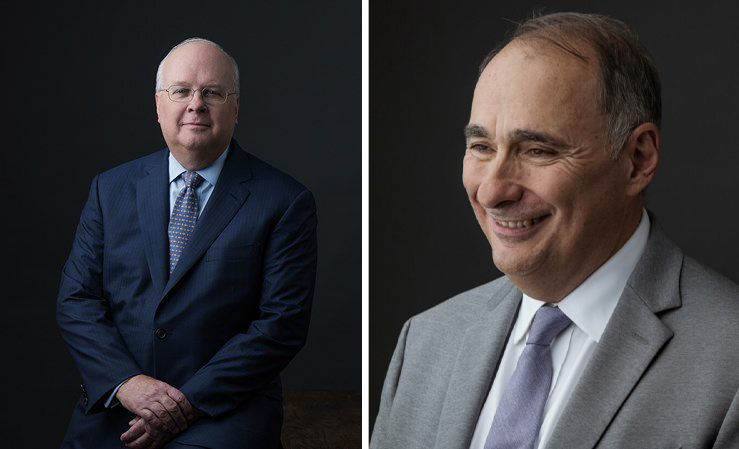
James Buckser
Staff writer
David Axelrod thinks he and Karl Rove are “opposite numbers” across the political divide.
Despite their differences, Rove said, the pair try to collaborate without losing civility.
“Do we have to agree upon everything, or can we have disagreements and still be civil?” Rove said. “David and I have shared views; there are things that we agree upon, there are things we disagree upon, but when we disagree, we can do so without having to become disagreeable.”
Axelrod and Rove will appear together in discussion at 10:45 a.m. today in the Amphitheater, closing out Week Eight of the Chautauqua Lecture Series and its theme “Freedom of Expression, Imagination, and the Resilience of Democracy.”
Axelrod and Rove have both served as strategists for successful presidential campaigns for Barack Obama and George W. Bush, respectively, and both have been critical of the other’s candidate.
Despite these differences, they have spoken together many times.
“I can’t say that we’ve never raised our voices in these exchanges, because we’re both very passionate,” Axelrod said. “I’m sure that we’ve maintained that level of mutual regard, and I think probably there are people in my party who disapprove of that, another are people in his party who disapprove of that, but I think we’re both very comfortable.”
Axelrod said while he and Rove knew each other “from a distance” before, on opposite sides of campaigns, they first started working together after he read Rove’s autobiography.
“I learned that his mother had died by suicide, and my father had died by suicide,” Axelrod said. “I called Karl, and I suggested that we should do some things together about suicide awareness, because it might help people.”
Axelrod said he felt it would be a “good signal” to present two people with “starkly different views” on politics, and show that they share a “common humanity,” and “relate to each other as human beings.”
Rove said he and Axelrod will discuss the current political climate, which he called “highly divisive, polarized, angry.” Rove said his message will be that “it’s bad today, but it’s been worse before, and it will get better.”
“We sometimes forget that our history is replete with examples of our politics being broken, and of us being able to survive and prosper despite that,” Rove said.
Axelrod said he felt that free expression is an “integral part of a healthy democracy,” and highlighted the importance of hearing a “wide range of views.”
“You don’t have to agree with those views, but we should strive to understand them and engage in civil discourse,” Axelrod said. “I disagree with Karl on a variety of things, but I never question his patriotism or love of country, simply because we have different points of view, and I think that’s important. Hopefully, he and I appearing together will help underscore that value.”
Axelrod said a “wildcard” facing the modern political sphere is social media.
“The instantaneous speed at which incendiary things are communicated and injected into the bloodstream with absolute precision, guided by algorithms and big data,” Axelrod said. “I think that’s a challenge for our democracy. It’s a challenge for this notion of civil discourse.”
Rove said while we have experienced disinformation in the past, social media is a “different kind of an animal.”
“You think this is the first time we’ve had to deal with the problem of disinformation? No, that’s not what history suggests,” Rove said. “This is one of the things that we have to overcome, how we find our way back to a place where we have confidence and a certain level of trust in our institutions and in our leaders, and that’s part of the process.”
Axelrod said being “shoved into silos” by algorithms has a negative effect on our democracy.
“Our views are affirmed and everybody outside is considered alien and dangerous, it ruptures our democracy,” Axelrod said. “I think one big project is, how do we overcome that?”
While Rove said the current political climate was polarized, he also sees things going in a “positive direction.”
“Each time we’ve had one of these episodes, the country has found itself in a place where — because of leadership and because of the nature of the American people, and because not everything depends on government — the country gets moving in the right direction,” Rove said.
Rove hopes Chautauquans see that people “can have different political viewpoints and yet be friends.”
“There are oftentimes more things that we agree upon, particularly the facts of politics, than might be expected,” Rove said.
Axelrod said he hopes to spend time discussing and “diving into” challenges to democracy, freedom of expression and civil discourse.
“In this day and age, more and more we invalidate speech we don’t like, we cancel speech we don’t like or we disagree with, and that’s deeply unhealthy,” Axelrod said. “Two people of different political views sitting together and having a reasoned conversation hopefully, if nothing else, will model a better path.”




